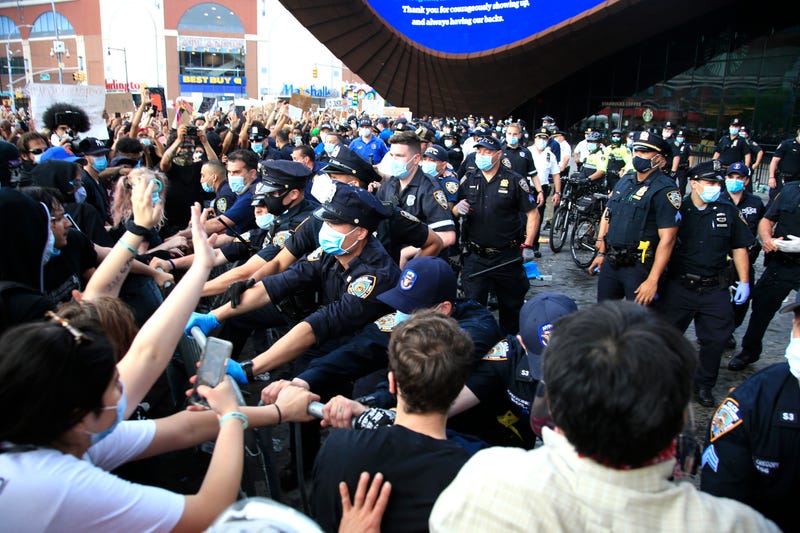
NEW YORK (1010 WINS) -- The Civilian Complaint Review Board, the agency tasked with monitoring NYPD misconduct, has substantiated abuse claims against 145 officers from the 2020 protests against police violence that started in response to the murder of George Floyd.

Of the 321 complaints filed, 267 have been substantiated against 145 police officers, according to new data released by the CCRB.
“We are approaching the two-year anniversary of the death of George Floyd which sparked thousands of protests around the world,” said Interim CCRB Chair Arva Rice. “While New Yorkers took to the streets across all five boroughs to protest police brutality, hundreds of people faced fresh incidents of police misconduct. The CCRB was flooded with complaints… As of last week, the CCRB has finalized 98% of cases and submitted its recommendations to the NYPD.”
Seventeen cases have resulted in exonerations, though some others were closed without substantiation or exoneration — an admission by the agency that there was not enough information to rule either way.
The CCRB closed 26% of fully investigated cases due to an inability to identify the officers involved.
This statistic reflects a failure among officers to follow protocols that are designed to bolster police transparency and accountability, according to the CCRB.
Only 10% of all other cases in 2020 were closed due to inability to identify an officer.
“In the height of the pandemic, our investigators used all possible resources, including thousands of hours of BWC footage, civilian footage, police records and more, to fairly and impartially investigate some of the most complicated cases the Agency has seen,” said Rice.
While the CCRB can make recommendations, it is ultimately NYPD Commissioner Keechant Sewell’s decision whether or not to punish an officer. Sewell can also decide the manner of punishment.
The CCRB recommended charges and specifications, the most severe level of discipline available, against 88 officers.
Seventy-eight of those officers will face a trial by the CCRB’s Administrative Prosecution Unit.
If found guilty, the officers could lose vacation days, face suspension or lose their jobs.
The NYPD has closed 44 cases so far, waiving discipline for more than half of those.
No charges and specifications trials have finished yet. That means the harshest punishments that have been applied for misconduct during the protests is command discipline, which can result in an officer losing up to 10 vacation days.
In other cases the NYPD punished its officers with warnings or training despite harsher recommendations.
In the case of Officer Joseph Nicoletti for example, the CCRB believes he committed a use of force violation and recommended charges. Instead, the NYPD “warned and admonished” him.
The CCRB also substantiated a force complaint against Detective Jason Ragoo. The agency recommended charges, but instead he’ll receive training.
The watchdog plans to release a report on how to improve NYPD protest response once the final cases are closed.


